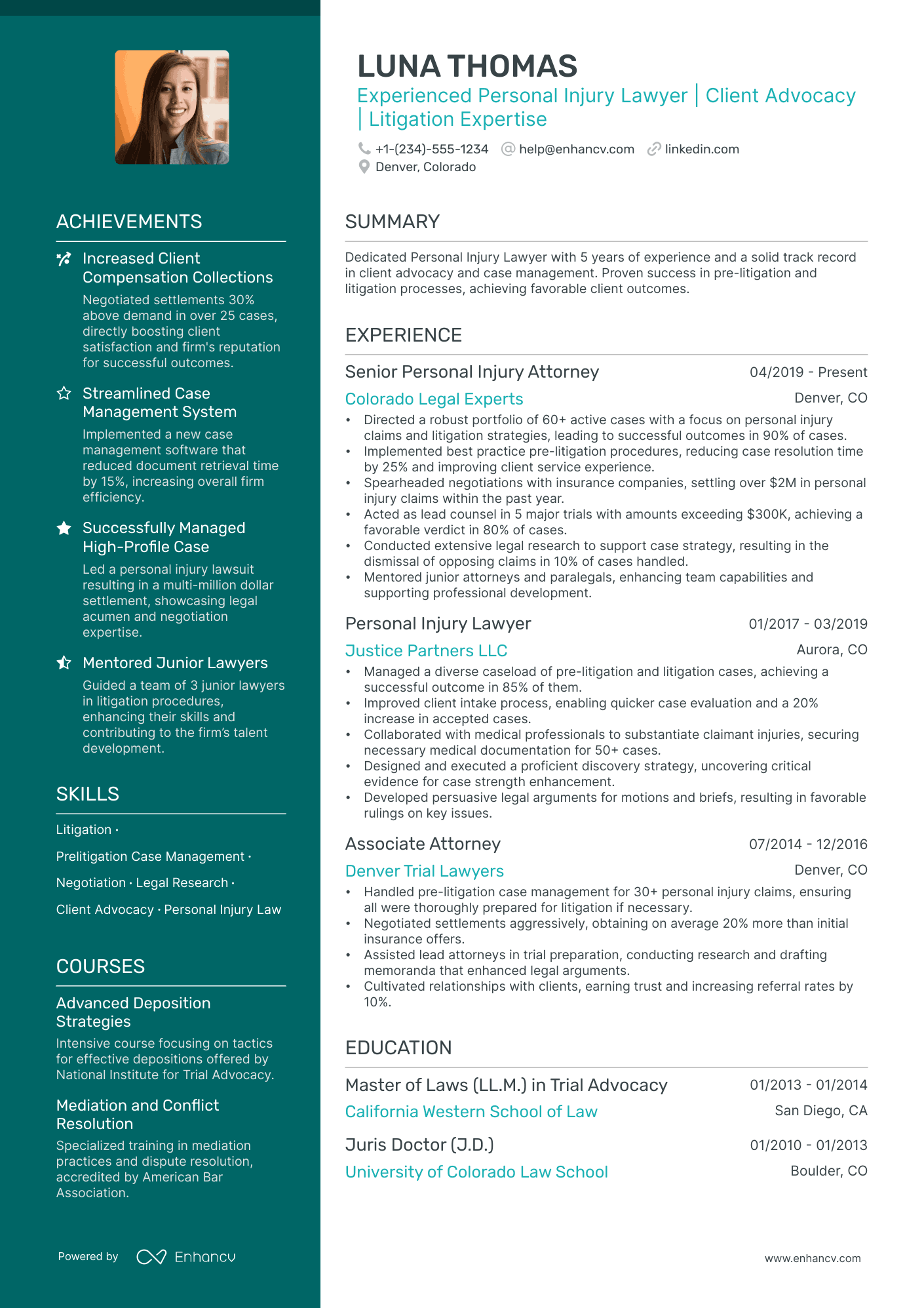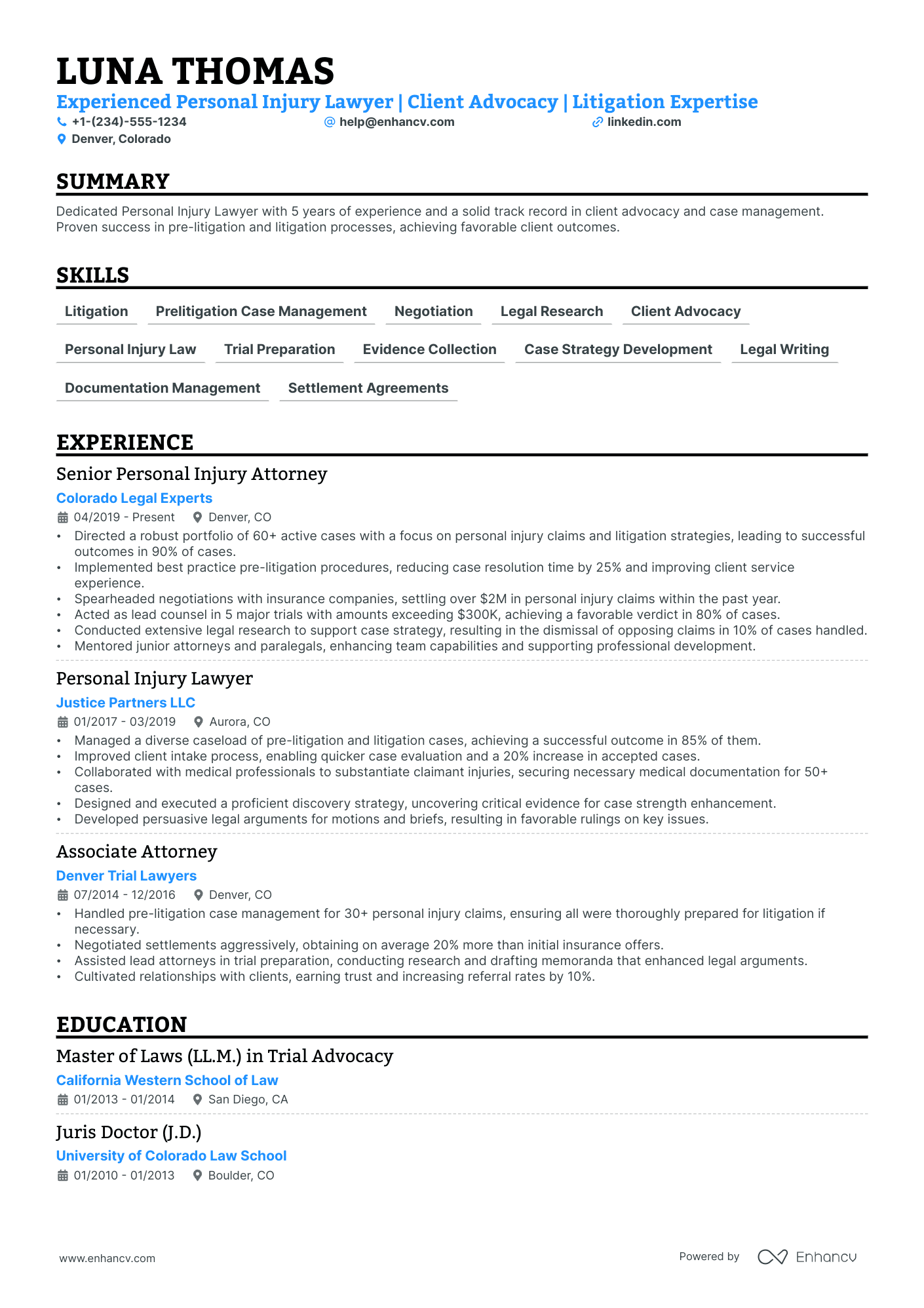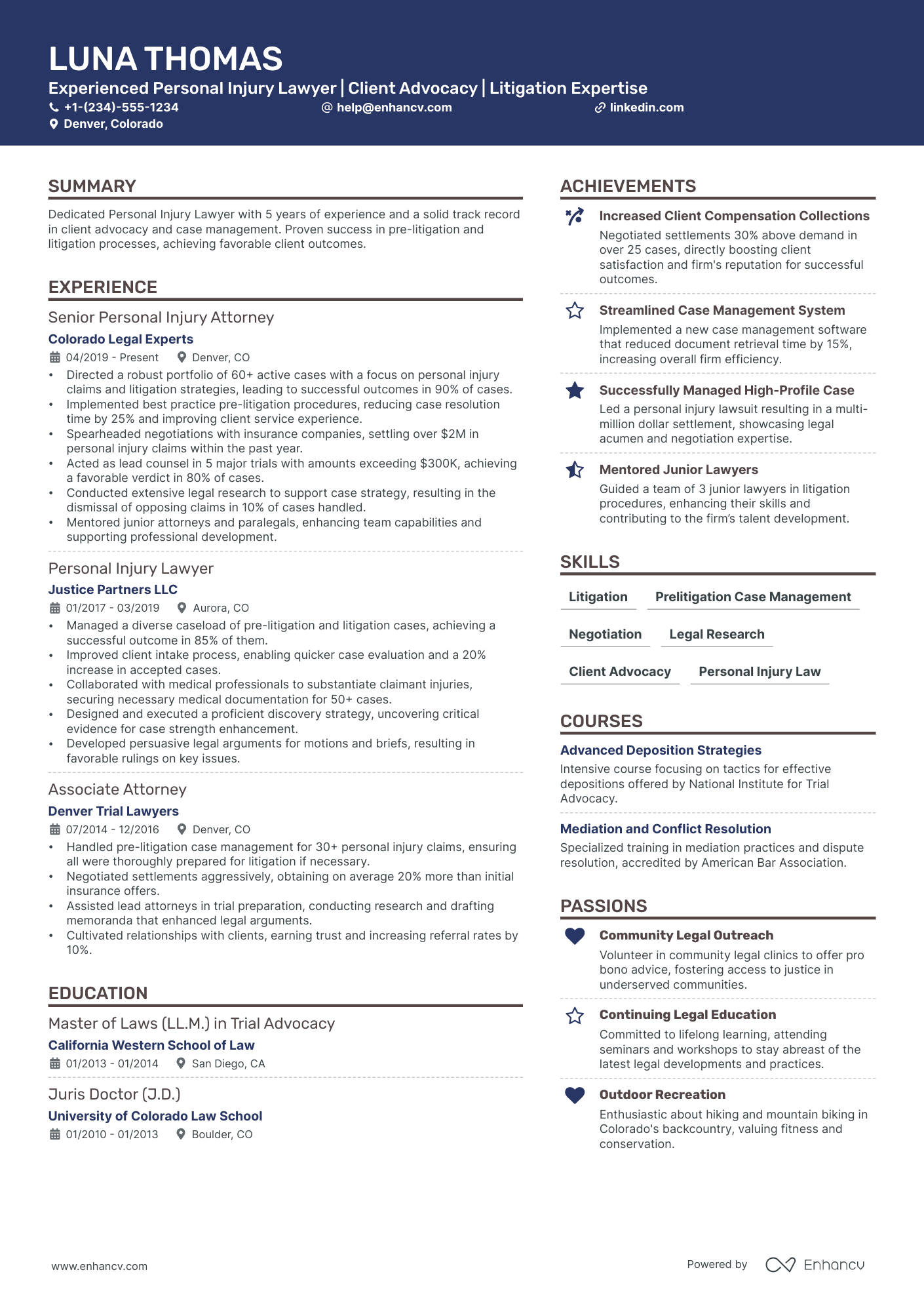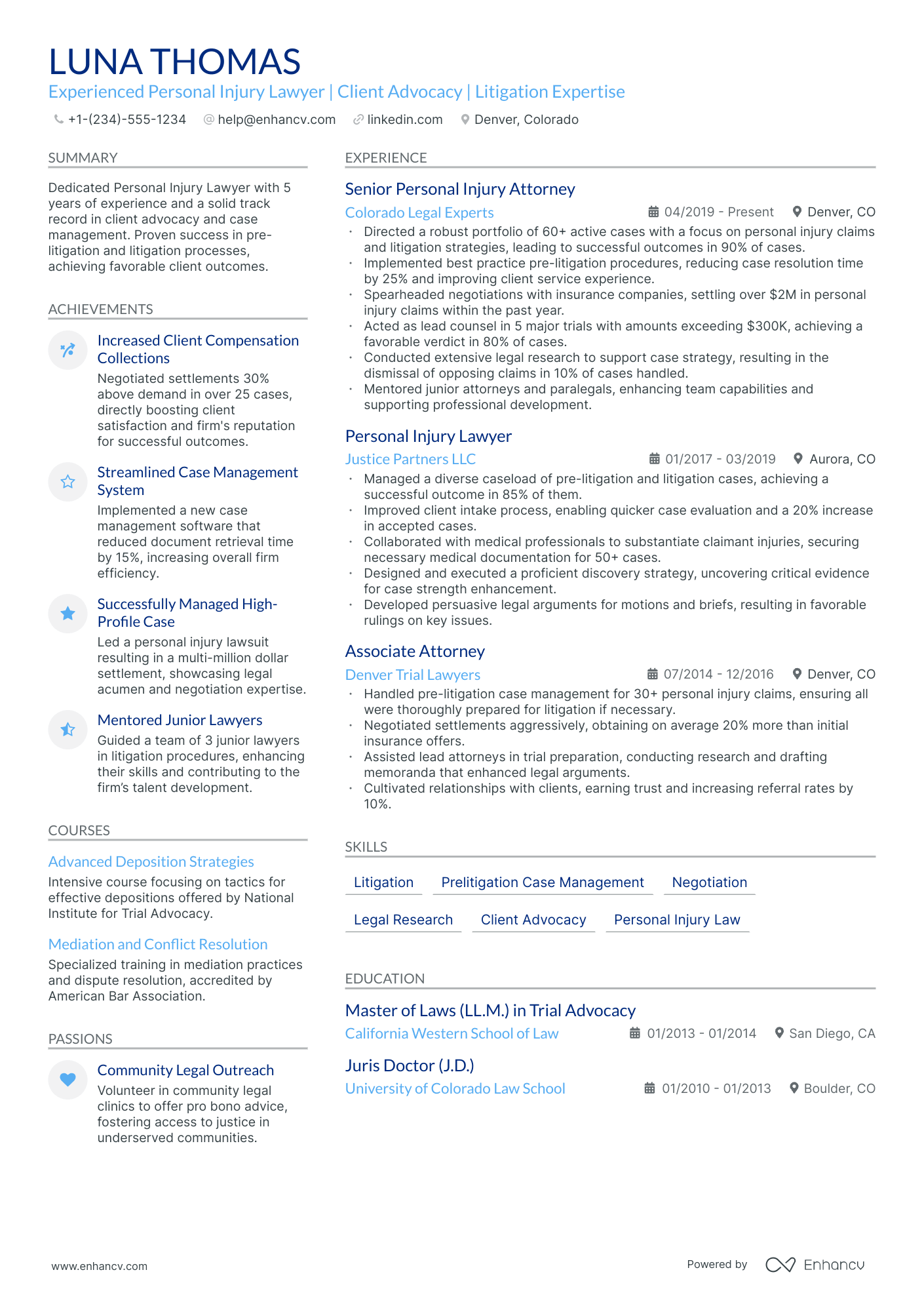As a litigation lawyer, one resume challenge you may encounter is effectively showcasing your courtroom successes and legal advocacy skills without breaking client confidentiality. Our guide provides strategic tips on how to highlight your litigation achievements using anonymized case examples and skill-centric language that catches employers' attention responsibly.
- Apply best practices from professional resumes to spotlight your application;
- Quantify your professional experience with achievements, career highlights, projects, and more;
- Write an eye-catching litigation lawyer resume top one-third with your header, summary/objective, and skills section;
- Fill in the gaps of your experience with extracurricular, education, and more vital resume sections.
We've selected, especially for you, some of our most relevant litigation lawyer resume guides. Getting you from thinking about your next career move to landing your dream job.
Is there a correct way to format your litigation lawyer resume?
This is a tricky question. While skimming over your resume, recruiters will be looking at your experience and the message your profile conveys. That's why your resume format needs to be clear and concise, serving to supplement and organize your experience. Professional best practices point that the best litigation lawyer resumes:
- Follow the reverse chronological order, where the most recent experience items are presented first . This is to keep your expertise succinct and to show recruiters your career growth over the years;
- Have a clearly defined header that includes all relevant contact information and a portfolio or a LinkedIn link. In some countries, it is acceptable to include a professional photo , so that your application is more memorable;
- Feature the most important litigation lawyer resume sections towards the top, e.g. summary, skills, and experience. That way, recruiters can immediately find information that is relevant to the role;
- Take up no more than two pages - and two pages are the exception for more experienced professionals. Keep your expertise to the point and use your litigation lawyer resume real estate wisely .
- Selecting modern, yet simple fonts, e.g. Rubik, Lato, etc., would help your application stand out;
- Many candidates stick with the tried-and-tested Arial or Times New Roman, but you'd want your litigation lawyer resume to be a bit more unique;
- The ATS can read all serif and sans-serif fonts, so you should avoid fancy, formal script (or cursive) fonts.
Upload & Check Your Resume
Drop your resume here or choose a file. PDF & DOCX only. Max 2MB file size.
PRO TIP
Listing your relevant degrees or certificates on your litigation lawyer resume is a win-win situation. Not only does it hint at your technical capabilities in the industry, but an array of soft skills, like perseverance, adaptability, and motivation.
The key to your litigation lawyer job-winning resume - present your expertise with these sections:
- A header to make your resume more scannable
- Snapshot of who you are as a professional with your resume soft skills, achievements, and summary or objective
- Job advert keywords in the skills section of your resume
- Resume experience quantifying your past job successes with metrics
- A relevant education, certification, and technical sills section to provide background to your technological/software capabilities
What recruiters want to see on your resume:
- Track record of success in trials, including cases won or favorable settlements achieved.
- Proficiency in legal research, writing, and analysis, with examples of motions or briefs authored.
- Experience in conducting depositions, arbitration, and expert witness examination.
- Knowledge of specific areas of law relevant to the position, such as intellectual property, personal injury, or commercial litigation.
- Demonstrated skills in client relationship management and development, with references from clients or partners.
Advice for your litigation lawyer resume experience section - setting your application apart from other candidates
Your resume experience section needs to balance your tangible workplace achievements with job requirements.
The easiest way to sustain this balance between meeting candidate expectations, while standing out, is to:
- Select really impressive career highlights to detail under each experience and support those with your skills;
- Assess the job advert to define both the basic requirements (which you could answer with more junior roles) and the more advanced requirements - which could play a more prominent role through your experience section;
- Create a separate experience section, if you decide on listing irrelevant experience items. Always curate those via the people or technical skills you've attained that match the current job you're applying for;
- Don't list experience items from a decade ago - as they may no longer be relevant to the industry. That is, unless you're applying for a more senior role: where experience would go to demonstrate your character and ambitions;
- Define how your role has helped make the team, department, or company better. Support this with your skill set and the initial challenge you were able to solve.
Take a look at how real-life litigation lawyer professionals have presented their resume experience section - always aiming to demonstrate their success.
- Managed a portfolio of complex commercial litigation cases for large-scale clients in the technology sector, significantly reducing client risk exposure.
- Implemented innovative legal strategies for intellectual property disputes resulting in a 70% win rate for the firm’s high-stakes cases.
- Led a team of junior lawyers and paralegals, providing mentorship and training that increased department efficiency by 30%.
- Spearheaded the cross-border litigation team, successfully defending clients in international trade disputes and navigating complex legal frameworks.
- Conducted over 100 depositions and court appearances, demonstrating exceptional litigation skills and maintaining a strong reputation in the legal community.
- Authored and presented training materials on litigation best practices at national legal conferences, contributing to the profession's body of knowledge.
- Crafted persuasive legal arguments for civil litigation cases, which led to a 40% increase in case settlements in favor of our clients.
- Managed discovery processes efficiently, reducing costs for the firm by 25% through the use of advanced e-discovery software.
- Represented a diverse clientele, including Fortune 500 companies, in high-profile product liability cases.
- Effectively managed a docket of 50+ ongoing cases for a prestigious boutique law firm, prioritizing critical motions and trials under tight deadlines.
- Negotiated favorable settlements in 80% of pretrial mediations, reflecting strong negotiation skills and deep understanding of legal precedents.
- Authored appellate briefs and successfully argued cases before the state appellate court, achieving reversals of lower court decisions in 60% of cases.
- Currently leading the defense in a high-profile class action suit involving over 1,000 claimants, coordinating with a team of specialists to create a robust defense.
- Initiated and fostered relationships with key expert witnesses, leading to pivotal testimonies that have supported the firm’s case strategies.
- Pioneered the use of virtual simulations in courtroom presentations, enhancing juror comprehension and contributing to favorable verdicts in complex cases.
- Directed legal research efforts that uncovered critical precedents, leading to successful motion practice in federal and state courts.
- Served as a key negotiator in multiparty litigation, carving out settlements that minimally impacted client operations and finances.
- Developed a comprehensive seminar on electronic evidence handling which improved the litigation team’s capabilities in dealing with digital data.
- Designed and executed complex litigation strategies for antitrust cases, which led to the dismissal of key claims against corporate clients.
- Played a critical role in growing the firm's litigation department by 20%, attracting high-profile clients through successful case outcomes.
- Focused on risk management and compliance, ensuring that clients avoided future litigation through proactive legal counseling.
- Developed and implemented cost-effective litigation plans for small to medium-sized businesses, enhancing their legal standing without overburdening resources.
- Facilitated a workshop on litigation risk assessment for in-house counsel, leading to a more informed and strategic approach to dispute resolution.
- Coordinated multi-party defense in a landmark environmental litigation case, which resulted in a precedent-setting decision in environmental law.
Quantifying impact on your resume
- Include the number of cases litigated to quantify litigation experience.
- List the percentage of cases won to showcase success rate.
- Specify the total value of settlements negotiated to demonstrate financial impact.
- Mention the number of clients represented to indicate the breadth of experience.
- Add the number of pro bono hours contributed to highlight community involvement.
- Identify the amount of time reduced in case preparation through process improvements.
- Report the number of legal precedents set to show influence in the legal field.
- Detail the size of the legal teams managed to convey leadership skills.
Action verbs for your litigation lawyer resume
Four quick steps for candidates with no resume experience
Those with less or no relevant experience could also make a good impression on recruiters by:
- Taking the time to actually understand what matters most to the role and featuring this within key sections of their resume
- Investing resume space into defining what makes them a valuable candidate with transferrable skills and personality
- Using the resume objective to showcase their personal vision for growth within the company
- Heavily featuring their technical alignment with relevant certifications, education, and skills.
Remember that your resume is about aligning your profile to that of the ideal candidate.
The more prominently you can demonstrate how you answer job requirements, the more likely you'd be called in for an interview.
Recommended reads:
PRO TIP
The more time and effort you've put into obtaining the relevant certificate, the closer to the top it should be listed. This is especially important for more senior roles and if the company you're applying for is more forward-facing.
Popular litigation lawyer hard skills and soft skills for your resume
Apart from assessing your professional expertise, recruiters are on the lookout for whether your skills align with the job.
Your profile would thus be assessed in regard to your:
- Hard or technical skills - your ability to perform on the job using particular technologies or software
- Soft skills - how you adapt, communicate, and thrive in different environments.
Both types of skills - hard and soft skills - are important for your resume, so make sure to create a dedicated skills section that:
- Lists up to five or six skills that align with the job advert.
- Integrates vital keywords for the industry, but also reflects on your personal strengths.
- Builds up further your skills with an achievements section within which you explain what you've achieved thanks to using the particular skill.
- Aims to always quantify in some way how you've used the skill, as it's not enough to just list it.
What are the most sought out hard and soft skills for litigation lawyer roles?
Check out the industry's top choices with our two dedicated lists below:
Top skills for your litigation lawyer resume:
Legal research
Legal writing
Litigation strategy
Civil procedure knowledge
Evidence gathering and analysis
Trial preparation
Case management
Pleadings and motions drafting
Negotiation
Understanding of substantive law
Analytical thinking
Attention to detail
Oral advocacy
Written communication
Client management
Time management
Resilience
Persuasiveness
Teamwork
Problem-solving
PRO TIP
Bold the names of educational institutions and certifying bodies for emphasis.
How to include your education and certifications on your resume
We're taking you back to your college days with this part of our guide, but including your relevant higher education is quite important for your resume.
Your degree shows recruiters your dedication to the industry, your recent and relevant know-how, and some form of experience in the field.
Your litigation lawyer resume education should:
- Include your applicable degrees, college (-s) you've graduated from, as well as start and end dates of your higher education;
- Skip your high school diploma. If you still haven't graduated with your degree, list that your higher education isongoing;
- Feature any postgraduate diplomas in your resume header or summary - this is the perfect space to spotlight your relevant MBA degree;
- Showcase any relevant coursework, if you happen to have less professional experience and think this would support your case in being the best candidate for the role.
As far as your job-specific certificates are concerned - choose up to several of the most recent ones that match the job profile, and include them in a dedicated section.
We've saved you some time by selecting the most prominent industry certificates below.
The top 5 certifications for your litigation lawyer resume:
- Certified Legal Specialist (CLS) - State Bar Association
- Civil Litigation Certification (CLC) - National Board of Legal Specialty Certification
- Litigation Management Professional (LMP) - Claims and Litigation Management Alliance
- Certified E-Discovery Specialist (CEDS) - Association of Certified E-Discovery Specialists
- Trial Advocacy Certificate (TAC) - National Institute for Trial Advocacy
PRO TIP
The more time and effort you've put into obtaining the relevant certificate, the closer to the top it should be listed. This is especially important for more senior roles and if the company you're applying for is more forward-facing.
Recommended reads:
Deciding between a resume summary or objective for your litigation lawyer role
Understanding the distinction between a resume summary and an objective is crucial for your litigation lawyer resume.
A resume summary, typically three to five sentences long, offers a concise overview of your career. This is the place to showcase your most pertinent experience, key accomplishments, and skills. It's particularly well-suited for those with professional experience relevant to the job requirements.
In contrast, a resume objective focuses on how you can add value to potential employers. It addresses why they should hire you and outlines your career expectations and learning goals. Therefore, it's ideal for candidates with less experience.
In the following section of our guide, explore how resume summaries and objectives differ through some exemplary industry-specific examples.
Resume summaries for a litigation lawyer job
- With over a decade of dedicated experience in complex commercial litigation, I have honed my ability to deliver favorable outcomes, including a landmark $2M settlement. My expertise in trial preparation, discovery, and legal research is complemented by a deep understanding of business law and corporate disputes.
- As a committed litigator with 8 years of courtroom experience, my career is marked by successfully representing clients in high-stakes IP litigation cases, with a notable win ratio of 80%. Proficient in evidence gathering and legal strategy formulation, I specialize in turning intricate legal challenges into decisive victories.
- Moving from a seasoned career in forensic accounting to litigation law, I bring a unique perspective complemented by rigorous analytical skills. My quantitative background has been instrumental in a series of financial fraud trials, resulting in the recovery of assets worth over $5M. Eager to leverage this experience in advocating for justice.
- Transitioning from a successful tenure in academic research, my skills in critical analysis and attention to detail are my greatest assets. With a Ph.D. in History and extensive knowledge of historical legal systems, I am ready to apply my unique insight and methodical approach to contemporary legal proceedings and advocacy.
- Eager to apply my passion for law and justice, I aim to embark on my legal career in litigation by leveraging my recent Juris Doctor degree. My commitment to learning and utilizing state-of-the-art legal research tools will drive my contribution to successful case outcomes and the growth of practice expertise.
- With a fresh Juris Doctorate from a top-tier law school, my enthusiasm for litigation is driven by a strong foundational knowledge of legal principles and a dedication to public service. I strive to develop hands-on experience, provide top-notch legal representation, and achieve impactful results for clients in the realm of civil litigation.
Other relevant sections for your litigation lawyer resume
Apart from the standard litigation lawyer resume sections listed in this guide, you have the opportunity to get creative with building your profile. Select additional resume sections that you deem align with the role, department, or company culture. Good choices for your litigation lawyer resume include:
- Language skills - always ensure that you have qualified each language you speak according to relevant frameworks;
- Hobbies - you could share more about your favorite books, how you spend your time, etc. ;
- Volunteering - to highlight the causes you care about;
- Awards - for your most prominent litigation lawyer professional accolades and achievements.
Make sure that these sections don't take too much away from your experience, but instead build up your litigation lawyer professional profile.
Key takeaways
- Ensure your litigation lawyer resume uses a simple, easy-to-read format that reflects upon your experience and aligns with the role;
- Be specific within the top one-third of your resume (header and summary or objective) to pinpoint what makes you the ideal candidate for the litigation lawyer role;
- Curate information that is tailored to the job by detailing skills, achievements, and actual outcomes of your efforts;
- List your certifications and technical capabilities to demonstrate your aptitude with specific software and technologies;
- The sections you decide on including on your litigation lawyer should pinpoint your professional expertise and personality.






